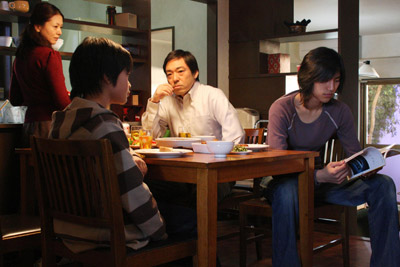
It's fairly safe to say that there is no way I could have not liked this film. From beginning to end, everything from pacing to music to cinematography was right up my alley. So consider this review officially biased.
The movie opens in a darkened Japanese apartment in the suburbs of Tokyo. A storm is brewing in the distance, literally and metaphorically, and a gust of wind has blown through the apartment, billowing the curtains and rustling papers across the floor. It ends with a slight breeze, playfully rippling at another curtain, the sounds of Debussy's Claire de Lune closing the film on a tranquil note. Between these extremes, the story unfolds slowly and steadily, building to a surreal crescendo before winding down. The aesthetic is subdued, but at times quietly abrasive, like a loud clap of thunder in a spring storm.
The director, Kiyoshi Kurosawa, is most well known as a prominent figure from the Japanese horror renaissance of the last two decades. His most famous film Pulse (also known as Kairo, it was the basis for a 2005 American remake) is an apocalyptic thriller in which the dead return for the living through the ubiquitous technology that has absorbed the modern world. His 2003 drama Bright Future, a meditation on disenchanted youth, has long been one of my favorite films. Both are grounded in the loneliness and isolation of the contemporary world. Tokyo Sonata may be the culmination of Kurosawa's earlier work: the subtle aesthetic of films like Pulse and Cure, melded with the plaintive view of the disparateness of contemporary urban Japan.
The story begins with the forced resignation of Ryūhei Sasaki (Kagawa Teruyuki 香川 照之), who has grown comfortable in his career as a low-level manager at a bureaucratic office job. After his position is outsourced to China, he spends his days in humiliating interviews for jobs he has no qualifications for, or in unemployment lines, where he links up with an old friend who has also recently lost work. When his friend commits suicide, Ryūhei takes work as a janitor at the local shopping mall, though never fully accepting his fall from grace.
A typical patriarch trying to hold together his crumbling family life, he hides his work situation from his wife Megumi (Koizumi Kyōko 小泉今日子), the latter's days consisting of a lonely routine of menial housework and tending to her unappreciative husband and two sons. The younger son, Kenji is quiet and brooding, and when his father denies him permission to take piano lessons, he uses his lunch money to pay for classes on the sly from a beautiful young instructor who is going through divorce proceedings. Takashi, the older of the two, barely at home and hardly ever interacting with his family, cannot find work and so decides to sign up to serve in the American Army in Iraq. Eventually, everyone's secret is outed, along with their long-suppressed emotions, and the series of events that follows makes for a chaotically brilliant climax.

The technical side of the film is perhaps the most astonishing element. The cinematographer, long-time Kurosawa collaborator Ashizawa Akiko (芦澤 明子,one of Japan's few female cinematographers), alternates between metallic gray views of the Tokyo skyline to cramped sequences in the Sasaki home. Reminiscent of Christopher Doyle's work in In the Mood for Love, Ashizawa frames most of the shots from behind window panes or staircases. The voyeurism of the audience is blocked by these obstructions, just as the emotions of the characters are stifled by tradition and lack of communication. In one scene the family has just seated themselves around the dinner table. We watch from between the rails of the staircase as all wait for word from the father to pick up their chopsticks and begin the meal. Ryūhei takes a gulp of beer, there is an uncomfortable pause, then he imbibes another large gulp before announcing "let's eat". The dinner scene is shot in one long take, never drawing away from, but never too close to, the tension that thickens the air around the table. The score, written by composer Hashimoto Kazumasa, sounds like 1960's minimalism, in the vein of Terry Riley or early Philip Glass. It is the perfect fit for the mood of the film, melancholy and staccato, a subtle but steady accompaniment to the story.
Tokyo Sonata is a pensive film, but the viewer never feels overwhelmed by the events in the Sasakis' lives. In a speech given at the premiere in Japan, Kurosawa noted how audiences in Europe and the US told him they could identify with the difficulties and disappointments that unfold on screen. This is true. Like all good films, Tokyo Sonata is grounded in the local circumstances of its characters' lives, but is universal in the scope of its artistic vision. The sadness in the movie is catharsis for a society, and a world, grappling with the pressure and alienation of modern life. Kiyoshi Kurosawa captures this theme with the skill of a true auteur.
Official Website
